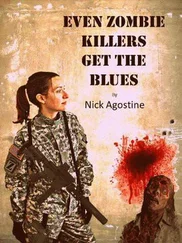“What is it with you people? I know you’ve had a bad experience here, but that’s no reason to be so damned rude. I was asked to do a job, and I’m here to do it. Now, do you want me to feed Ziggy or not?”
“Who?”
For a wild second, I thought this all might be a matter of mistaken identity or wrong iguana, since neither Kurtz nor his nurse seemed to know the iguana of the house by name.
I said, “The man who called said his iguana’s name was Ziggy. He said that was very important.”
Kurtz closed his eyes for a long moment, and I could see his chest rising and falling with deep breaths. The eddies under his skin twitched like living things trying to escape the light. When he opened his eyes, he seemed to have come to a conclusion that left him infinitely sad.
He said, “What else did he tell you?”
“He said Ziggy wasn’t in a cage, and that he liked yellow squash.”
He straightened his back, squared his shoulders, and lifted his neck. His hands came together at his waist to cinch his belt tighter. He was still grotesque, but now he was grotesque with pride.
He said, “I am Ken Kurtz, and I did not call you.”
Sounding desperate, Gilda said, “I say to her you no call.”
He ignored her. His eyes seemed to be piercing my skull, looking inside my brain, sifting all the information in it and coming up without the answer he wanted.
I said, “Do you have an iguana?”
“I do.”
“Is his name Ziggy?”
He hesitated. “You could say that.”
“Then somebody who knows you called me. Pretty funny that somebody would ask me to come here today, and then your guard gets shot in the head.”
His chest rose again in a long sigh and I mentally kicked myself. I shouldn’t have told him how the guard had been killed. I should have waited to see if he already knew that.
I said, “It’s cold outside. If Ziggy is in the courtyard, he should be brought indoors.”
He frowned and looked hard at Gilda. “The iguana is outside?”
Gilda’s delicate color had gone flour white, and she looked genuinely terrified. Ken Kurtz apparently wasn’t the kind of employer to cross. His mouth gashed and he made a sound of such rage that the nurse and I both backed up a couple of steps. It occurred to me that he might be even crazier than I was.
FOUR
Gilda made motions with her hands like circling fish, then abruptly darted from the room.
Trying to sound more confident than I was, I said, “I noticed you have a big oak tree in your courtyard. Ziggy’s probably up there. If you’ll point me toward the kitchen, I’ll see if I can coax him down with food.”
Mutely, he pointed in the same direction Gilda had run, and I went down a hall to a kitchen that made me think of a hospital. White ceramic tile was everywhere—on the floor, on the wall between cabinets and countertops, and on the countertops themselves. Large squares of shiny ceramic linked by nurse-white grout and surrounded by nurse-white cupboards, nurse-white walls, and nurse-white appliances. Not a spot of color intruded. Even the dish towels folded next to the white porcelain sink were bright white. A magnolia would have looked dingy in all that stark whiteness.
Feeling like a large dirty germ, I clumped to the big white refrigerator and pulled the door open. These people didn’t have color anywhere. No jars of purple jelly, no bottles of red ketchup, no green pickles. Nothing but stacks of packages neatly wrapped in white butcher paper, their corners and edges as squared as Christmas gift-wrapping. There was the same odd odor of iodine too. With my skin goose-bumping, either from the refrigerator’s cold air or the weirdness of its contents, I pulled out one of the lower vegetable drawers. No squash. No romaine. No vegetables of any kind. It was full of white packages too, all with that funny iodine smell.
I suddenly remembered that in some parts of the world, iguanas are slaughtered and eaten. Feeling slightly nauseated, I closed the refrigerator door and went looking for the nurse.
In the hallway, I heard the sound of theatrical sobbing. I followed the sound to a room as laboratory white as the kitchen. White walls, white draperies, white carpet, white painted furniture. Still wearing her surgical gloves, Gilda was face down on a double bed covered with a stark-white matelassé spread.
Oh, this was terrific. An impostor had hired me to take care of an iguana that wasn’t his. A guard hired to protect the iguana’s actual owner had been killed, and the iguana was possibly in the refrigerator in little white packages. To make this my really lucky day, the owner’s nurse was an incredibly beautiful flake. She might possibly be a murderous flake, guilty of killing both the guard and the iguana.
Since the house wrapped around a central courtyard, the layout was a bit disorienting. The four garages were on the south side, and the long living room with its huge fireplace took up the central part of the west wing. The dining room, kitchen, and Gilda’s room were the north wing. I could see, at a right angle to Gilda’s room, a long hallway running down the east side. Ken Kurtz’s bedroom was either there or in a south wing between the garages and the courtyard. I wondered if he and Gilda had something other than a patient-nurse relationship. Not that I was judging. If they were lovers, Gilda wouldn’t be the first beautiful woman to cozy up to a repulsive rich employer, nor would he be the first repulsive man to feel so grateful to have a beautiful woman in his bed that he’d give her anything she wanted.
I said, “Gilda, are those packages in the refrigerator iguana steaks?”
She raised a tearstained face and glared at me. “Who kill Ramón? How kill him? When? Why the policeman not tell me Ramón is dead?”
Even though she seemed too dramatic to be real, it occurred to me for the first time that she truly might not have known the guard was dead. Sergeant Owens might not have told her there had been a murder on the other side of the row of areca palms that separated the house from the guardhouse. Perhaps he had been waiting for Guidry to do it. Perhaps I shouldn’t have done it either. Perhaps I had done something that would cause Guidry to want to wring my neck.
Well, it wouldn’t be the first time.
I said, “I’m just a pet sitter, Gilda. I take care of animals. I don’t know the answers to those questions.”
“And I am nurse. I take care Mr. Kurtz. I don’t know about animal.”
“Okay, so taking care of the iguana isn’t your job. Just tell me what’s happened to him. Did somebody kill him?”
She buried her face in the bed and made some more sounds of racking sobs, but this time they seemed even more contrived. I had the feeling she was stalling for time while she thought up an answer.
The scraping sound of Ken Kurtz’s approaching footsteps made Gilda raise her head. As if she wanted to get the words out before Kurtz got to her door, she blurted out, “Is not dead. Is in wine room.”
I’ve stopped being surprised at the things rich people have in their houses. Poor people count themselves lucky to have running water and flush toilets. Middle-class people have living rooms and dining rooms, kitchens and bedrooms, bathrooms and closets. Rich people have things like ballrooms and movie rooms in their house. They have fitness centers that rival Gold’s gyms, along with game rooms and bowling alleys. Ken Kurtz apparently had a wine cellar, which, given the fact that you hit water if you dig three feet under Siesta Key’s sandy soil, meant he had a ground-level room dedicated to the storage of wines.
Being somewhere between poor and middle-class, the only thing I knew about wine cellars was that they were kept dark and at an even temperature. I wasn’t sure what the temperature was, but I knew it wasn’t warm enough for an iguana.
Читать дальше












